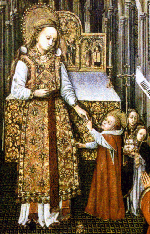


Dove ognuno è QUALCUNO da amare.
MEMBRO DELLA ANGLICAN FREE COMMUNION INTERNATIONAL
Membro del CONSIGLIO MONDIALE DELLE CHIESE CRISTIANE

FEMALE MINISTRIES AND THE GOSPEL
As we conceive it today, the concept of "sacred order", with its defined tripartite division (episcopate, presbyterate and diaconate), is not directly attributable to Jesus but the Church, along its journey through history, elaborates, based on of the community of believers, a vision of ministry, trying to draw from the indications - explicit and implicit - of Jesus. One of the arguments put forward by supporters of the exclusion of women from the ordained ministry, is the affirmation that "among the Twelve I do not count any woman ". It is true, however we cannot deduce from this the legitimacy of an exclusion of women from the Altar.
First of all, it is necessary to consider the historical and sociological context of the time: the Twelve as well as others close to the circle of Jesus led almost a common life with the Master or, in any case, shared various moments of his itinerant ministry; it is absolutely unthinkable that women could lead that lifestyle. However, this did not exclude the belonging of various women to Jesus and to the circle of the Twelve: in Lk 8,1-3 three women are mentioned who "assisted them with their goods". "To serve" is "diakoneô", a verb that in the primitive Church also indicated preaching and some liturgical services (as well as concrete service in charity).
Another commonplace of the supporters of exclusion is the presumed absence of women at the Last Supper, an event to which the institution of the so-called "ministerial priesthood" is traced: first of all, the Easter dinner, among the Jews, was the family celebration for antonomasia, from which no member of the circle of belonging was excluded. Mk 14, 17 tells that Jesus and the Twelve arrived when the Passover supper had already been prepared: it is very likely that it was prepared by the women (the men did not take care of the preparation of the food) while there is no trace that the women had been sent away (it was unlikely at that time of the evening) or that they had withdrawn at the time of the institution of the Eucharist.
Monsignor Adam Ignacio Maria Colabuig, dean of the Pontifical University ''Marianum'', affirms that '' the Gospel of John tells us that Mary was at the cross on the day of Good Friday. This means that she must have arrived in Jerusalem at least a day early. Furthermore, we know that Easter had a familiar character and women also participated in its celebrations. '' 'We also know - continues the dean of the faculty' '' Marianum '' - that Mary always followed the group of apostles and it is not at all to be excluded therefore that she, devout, was allowed to participate in the farewell of Jesus, on Thursday evening, before dying on the cross'''.
In Jn. 20:18 Mary Magdalene receives the mandate from Jesus to announce the Resurrection to the disciples. For this reason the Tradition remembers her as "apostola apostolorum." Mary of Magdala is the one who is part of the women following Jesus, who witnessed his death on the cross and to which the Master appears first after the Resurrection, making her first witness of the new life and the first herald of the Gospel; it is she who is sent by the disciples to bring the official announcement of the resurrection: "I have seen the Lord"; apostle of the apostles!
And that this could provoke some form of rebellion on the part of Yeshua's male following, the one most invested with authority within the nascent community, is testified by the apocryphal writings (hic traditio, historia loquitor ", ed)" (cftr. MCBomba, ocds, "E. Stein" Study Center).
The present participle of the mandate entrusted indicating a fixed action, to be repeated, therefore not relegated to the proclamation of the single event of the Resurrection but to preaching. In the apparition of which Acts 1,14ff tells us, in which the women are also present, it is clear that the task of preaching and proclaiming forgiveness and reconciliation is entrusted to all the disciples, therefore also to women. Naturally, female thought and the underlying egalitarian social conformation indignant some circles of Christians, proponents of the status quo, including one of the most famous apologists who expressed himself in this way, testifying even with his words that women in primitive Christianity certainly had a role of first floor: “These heretical women”, writes Tertullian, “how bold they are! They have no modesty, they are so brazen that they go as far as teaching, engaging in disputes, decreeing exorcisms, taking on assignments and even baptizing! [...] But a woman is not allowed to speak in church, or teach, or offer the Eucharist, or claim a part for herself in any male function, let alone any priestly office".










